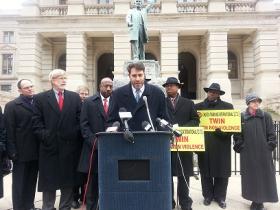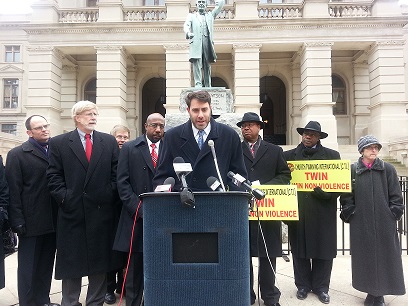A group of faith leaders Monday expressed opposition to a measure to allow the administrative boards of places of worship to decide if licensed gun holders could carry guns on their property. The bill would also extend the right to parts of college campuses and some government buildings.
While speaking in front of the state Capitol, Rabbi Peter Berg with The Temple says he’s against the measure because synagogues and churches should remain places of refuge.
“This is the last place on earth that people can go to get away from the violence that is so prevalent in our world.”

And even though those in charge of places of worship can decide under the bill whether or not to allow the right on their individual properties, Reverend Raphael Wornock of the Ebenezer Baptist Church says guns should not be allowed in churches or synagogues period.
“Who are our state legislators talking to? Whose bidding are they doing? We did not ask to opt in to have guns in our sanctuary.”
But Senator Frank Ginn says churches should have the right to decide. He sponsored the original senate bill the House amended.
“When you go to any type of gun free zone, what you’re putting out there for the public is that these people are defenseless, and I don’t think that’s the right answer for anybody. We have law abiding citizens in this state, and the folks who are going to get a carry permit and follow the law, those are the ones that we’re here to work for.”
Ginn is hopeful the final version will allow those with gun permits from other states to carry firearms in Georgia. Meanwhile, Governor Nathan Deal says lawmakers should work out the final details themselves, including whether or not guns should be allowed on parts of public college campuses. In general, he thinks individual churches should be able to opt into the law rather than to have to opt out.
“I would much prefer those institutions whether they be churches or otherwise who would allow that in their facilities to say so affirmatively rather than the other way around.”
House and Senate lawmakers will have to agree on a final bill.


9(MDAxODM0MDY4MDEyMTY4NDA3MzI3YjkzMw004))









